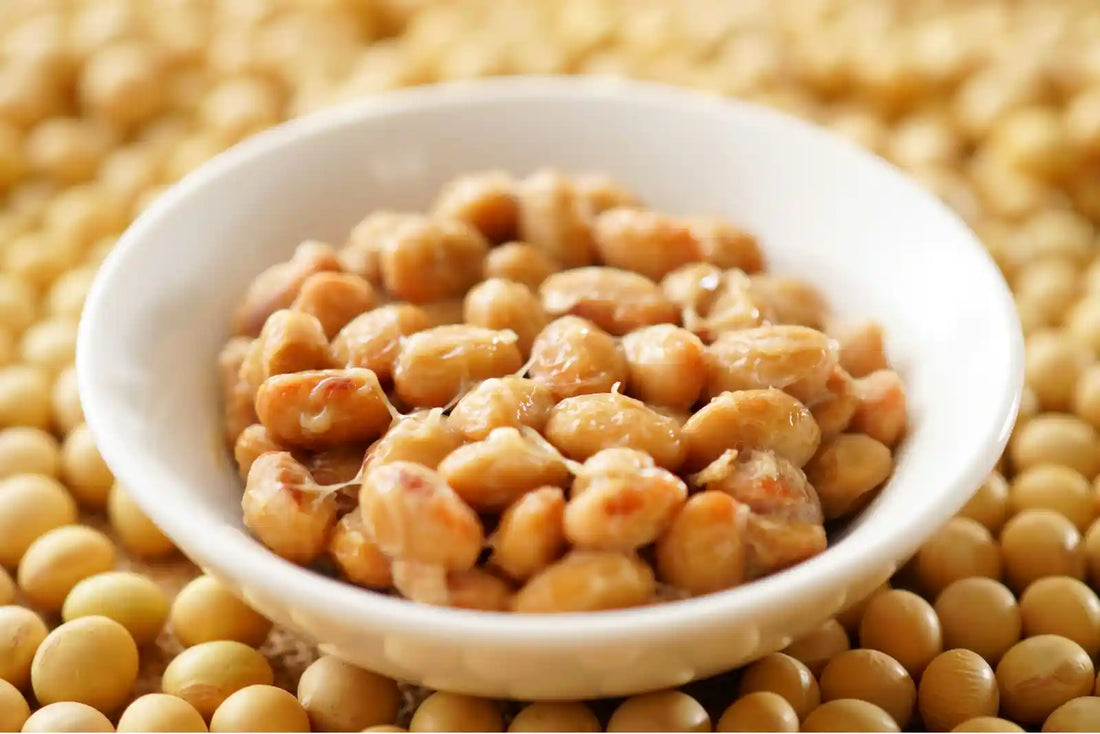
Vitamin K2 in one glance
Often overshadowed by its sibling vitamin K1, vitamin K2 plays a unique and essential role in long-term wellness. It activates key proteins that guide calcium to where it’s needed, into bones and teeth, while keeping it away from soft tissues like arteries. This dual-action support makes vitamin K2 a cornerstone for strength, mobility, and graceful aging.
The essentials
What it is: Vitamin K2 (menaquinone) is a fat-soluble vitamin that activates osteocalcin and matrix Gla-protein (MGP), two calcium-regulating proteins essential for bone mineralisation and vascular elasticity.
Where it lives: Found in fermented foods like natto and certain cheeses, though daily intakes remain very low in Western diets.
Why it matters: Vitamin K2 supports bone density and structure while helping maintain the flexibility of arteries and soft tissues, a delicate balance that becomes increasingly important with age.
Vitamin K2 in foods – a natural reference point
Fermented soybeans (natto): ~1,000 μg MK-7 per 100 g
Cheeses (aged): 20–50 μg MK-7 per 100 g
Natto remains rare outside East Asia, making it difficult to achieve clinically relevant intakes through food alone—especially in Western-style diets.
Three things to look for in a vitamin K2 formula
- Form, MK-7 – Menaquinone-7 is the most bioactive and longest-lasting form of K2 in the body.
- Stability and standardisation – A patented, well-characterised form ensures purity, consistency and shelf-life.
- Smart synergy – Often paired with vitamin D3 to enhance calcium absorption, while K2 ensures it’s properly utilised. The combination with omega-3s and olive oil not only improves absorption of fat-soluble vitamins but also adds cardiovascular and anti-inflammatory benefits.
MenaQ7®, our selected vitamin K2
What it is
MenaQ7® is the most clinically researched form of vitamin K2 as menaquinone-7. Developed in Norway and produced by Gnosis by Lesaffre, it offers a highly stable, bioactive form with proven efficacy in microgram doses.
What the research shows
Long-term studies in postmenopausal women show that MenaQ7® improves bone mineral density, supports arterial elasticity, and enhances the activity of vitamin K-dependent proteins like osteocalcin and MGP—helping to maintain calcium balance where it matters most.
Why we selected it
MenaQ7® represents the gold standard for vitamin K2 supplementation: well-researched, clinically aligned, and effective at low doses. Our formula provides 90 μg of menaquinone-7 (MenaQ7®) per daily dose, equal to 120% of the general vitamin K NRV*. This level mirrors the dosages used in key clinical trials supporting bone strength and vascular flexibility throughout midlife and beyond.
References
[1] EFSA NDA Panel (2017). Scientific Opinion on dietary reference values for vitamin K. EFSA Journal, 15(5):4780.
[2] Knapen MHJ, Drummen NE, Smit E, et al. (2013). Three-year low-dose menaquinone-7 supplementation helps decrease bone loss in healthy postmenopausal women. Osteoporosis International, 24(9):2499–2507.
[3] Knapen MHJ, Braam LAJLM, Drummen NE, et al. (2015). Menaquinone-7 supplementation improves arterial stiffness in healthy postmenopausal women. Thrombosis and Haemostasis, 113(5):1135–1144.
[4] Rønn SH, Husted SE, et al. (2016). Daily menaquinone-7 supplementation improves vitamin K status in healthy women: a randomized, double-blind, placebo-controlled study. Nutrients, 8(10):643.
[5] Popa DS, Bigman G, Rusu E, et al. (2021). Olive oil supplemented with menaquinone-7 significantly affects osteocalcin carboxylation in healthy adults: a randomized trial. British Journal of Nutrition, 126(11):1710–1719.
* Nutrient Reference Value. It is the daily amount of a vitamin or mineral set by the EU as sufficient for the average healthy adult. When a product states 100% NRV, it means one daily serving provides the full recommended daily intake. 👉 For Vitamin K2, there is no specific NRV in EU legislation. Label values are expressed against the general Vitamin K NRV (75 μg/day). As with many nutrients, NRVs are designed to cover minimum requirements for the general population, not necessarily the optimal intake for specific life stages or wellness goals.
📌 Disclaimer: This article is for informational purposes only and does not offer medical advice or make health claims. It outlines ingredient characteristics based on publicly available research. Individual responses may vary. For personal health decisions, please consult a qualified healthcare professional.